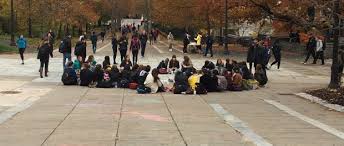 After the election, students at Cornell University organized a “cry in.” Much like the community students have sought through “safe spaces,” these students want to feel that they are not alone in their misery. They gathered to mourn the recent election of Donald Trump and console each other in their coming fear of a man who, they claim, is a bigot, sexist, misogynist, homophobe, xenophobe, and racist, among doubtless more personal attacks. Professors at other Universities have condoned similar behavior, cancelling tests throughout the week to accommodate the emotional “shock” of their students. People have fled to Facebook to voice their pain, writing that they will be “allies” to women, blacks, members of the LGBTQ community, and so forth. They claim that those who voted for Trump reflect the descriptors they have used for Trump–attacking their morals and character. These people make it seem as though everybody who voted for Trump did so out of hate; because they believe in a kind of white supremacy that demands that they bully people who are different. But that is the way they have seen this whole election. The media has presented Trump as this figure of hate, while the media presented Clinton as the beacon of love. Clinton would be able to support these minority groups and repress the bullying from the privileged. But a vote for Trump would condone it. Why have people become so weak to the point that they feel the need to publicly cry for the outcome of an election? And why has that become acceptable in this nation? Why have there been an increasing amount of “safe spaces” on campuses? It seems like the people who have cried, who have voiced their opinions against Trump and for Hillary, and who have felt the need for safe spaces on campuses do exactly what they claim they oppose. They use the system to accommodate their feelings and insult the people who don’t agree with them. They limit these conversations, which could be made about rational things such as policies and actual facts, down to merely emotional responses. And claim that anyone who disagrees with them is a bully and a horrible person. But, is it really the students’ fault? Many of the universities now have professors who support a progressive, liberal agenda. They reflect the arguments the media has used to demonstrate the weaknesses of those running. But because the media has relied so heavily on the emotional response of the voter, they have focused too much on name calling and mudslinging. So much so that those who claim are rational beings, the university student, is left with little or no means of expressing himself well. They rely on sudden bursts of rage on Facebook, or public displays of sadness through cry-ins, or signs of giving up through “safe spaces” because they think that those who disagree with them will hurt them in person. What happened to the idea of civil discourse? Has this tool, the very one that lets us express ourselves as people through communication and our use of reason, become just something of antiquity? Can we still fight back the animalistic urge to express ourselves in tears instead of reason? I think so. As Edmund Burke puts it, “To read without reflecting is like eating without digesting.” Let us read, then. And reflect. So that we may differentiate fact from opinion–truth from falsehood.
0 Comments
Leave a Reply. |
Jessica De GreeJessica teaches 5th grade English and History as well as 11th grade Spanish III at a Great Hearts Academy in Glendale, AZ. In addition to teaching, she coaches JV girls basketball and is a writing tutor for The Classical Historian Online Academy. Jessica recently played basketball professionally in Tarragona, Spain, where she taught English ESL and tutored Classical Historian writing students. In 2018, she received her Bachelor's degree in English and Spanish from Hillsdale College, MI. Archives
April 2020
Categories
All
|
|
SUPPORT
|
RESOURCES
|
|


 RSS Feed
RSS Feed



